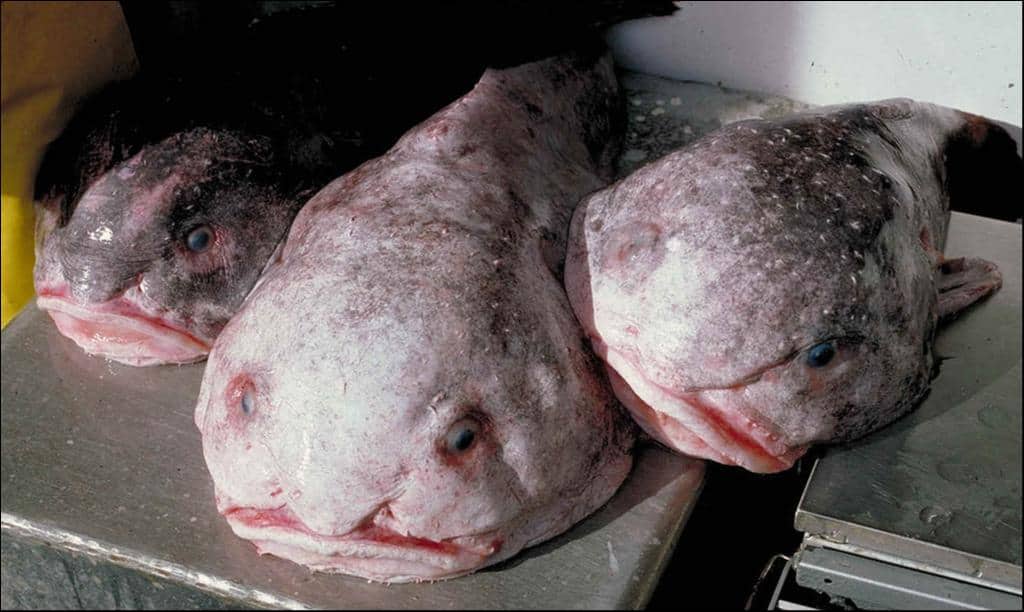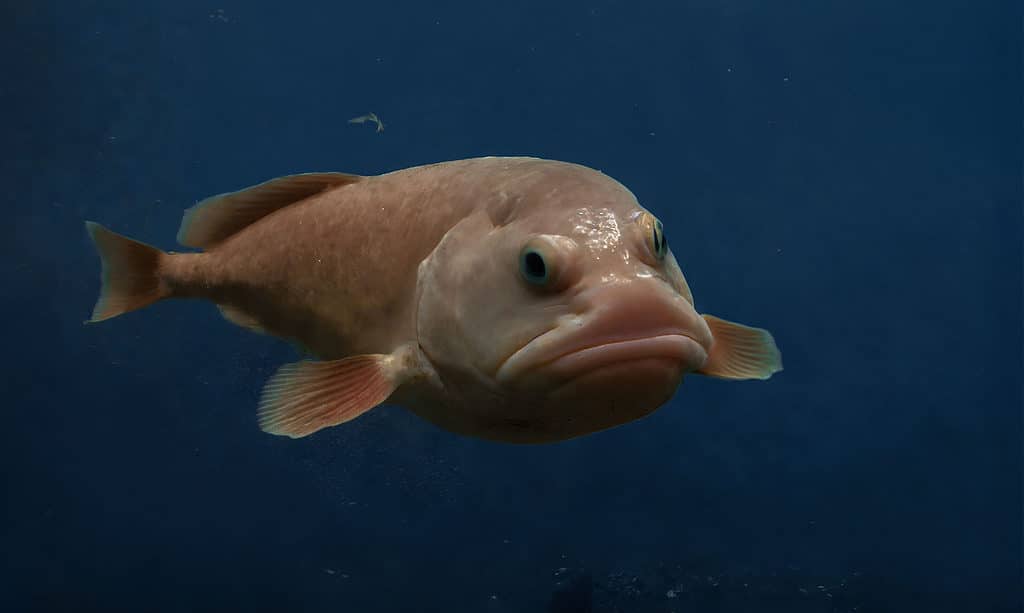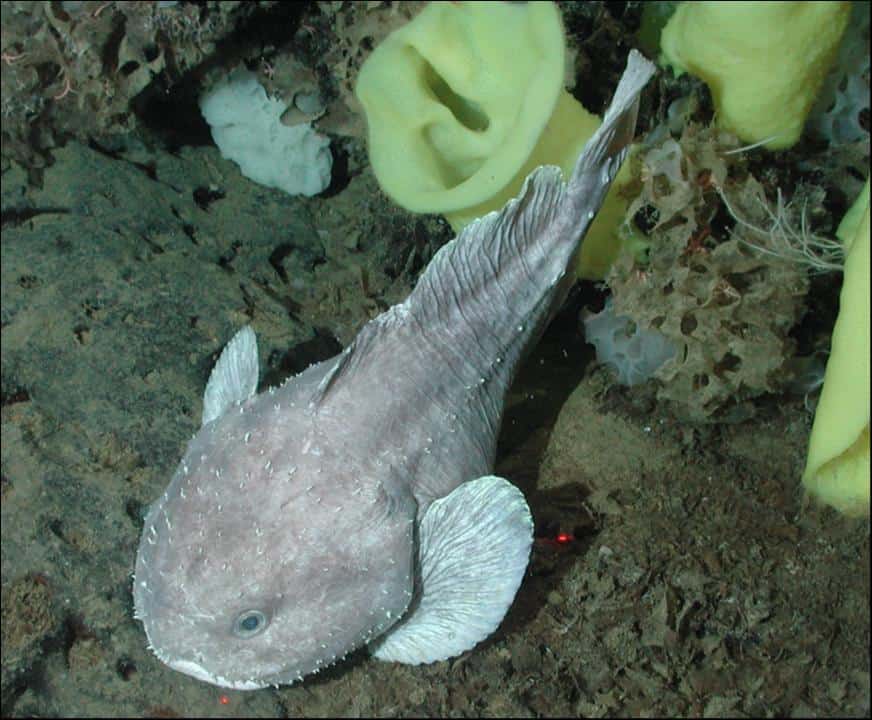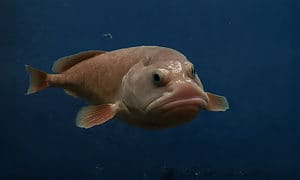Polar bears, snakes, reindeer, and even dogs have been on the menu for some sharks. The craziest thing a shark ever chowed down on was probably an echidna – otherwise known as a porcupine. A tiger shark off the coast of Australia ate one with all its spines intact!
But blobfish don’t have to worry. Sharks can’t reach them because they live too deep. Are there any deep-dwelling creatures that see blobfish as prey? Let’s find out.
Read on to learn all about blobfish predators and how these fish survive!
What Eats Blobfish?

Blobfish don’t have any predators.
©lacking author information / public domain – License
There isn’t anything on the food chain that eats blobfish. There aren’t any blobfish predators. Humans are this fish’s only threat. This is because they live at a depth of 2000 to 3900 feet, where the water pressure is too intense for most predators.
Blobfish are the sloth of the sea. They spend their entire life peacefully perched on the sea floor, only occasionally becoming active to feed on small crustaceans. They inhabit dark and cold ocean parts around Australia, Tasmania, and New Zealand. Their biggest threat is fishing nets that accidentally scoop them up.
Can You Eat a Blobfish?

The skin of blobfish is highly acidic.
©World-Wide-Photography/Shutterstock.com
People can eat blobfish, but they shouldn’t. Despite its appearance, blobfish is not a delicacy and has no commercial value due to its jelly-like flesh.
Eating these gelatinous fish can be risky due to their skin’s acidic consistency. Even though you shouldn’t eat blobfish, there’s still one man who gave it a try.
Alex Stollzno, an employee at Sydney Fish Markets, ate a blobfish. He may be the only person that can prove they ate one of these strange creatures.
The blobfish was caught in a fishing net, meaning it was an accident and not an intentional catch. Despite this, Alex decided to try. What was the fish like?
Alex described the taste as having a mild flavor but an acquired taste. He removed just a piece of fillet from the fish and then decided to blowtorch it. He said the fish was similar to a lobster tail. He cautioned, however, that one has to try little bits at a time in case it made him sick, as he had no idea if the fish was poisonous!
Blobfish may not be known for their taste, but they are an important part of the ocean’s biodiversity and should remain protected from overfishing. All jokes aside, the blobfish is an incredibly unique species deserving of our protection.
Eating blobfish isn’t just dangerous; it’s not helpful. We should all do our part to protect this species from losing its habitat due to overfishing and pollution. Let’s make sure the only way we can enjoy blobfish is through pictures or videos!
Can You Own a Blobfish?
You can’t own a blobfish, they wouldn’t survive life outside of the ocean. The blobfish is also not suitable for life in an aquarium. The extreme pressure of the deep-sea environment, which this fish is built to handle, cannot be recreated in captivity, so it would suffer immensely if kept in an artificial tank.
Why Blobfish Numbers Are Declining

Blobfish are often caught in trawlers.
©NOAA/MBARI / public domain – License
Sadly, the number of blobfish is declining for various reasons, including habitat destruction caused by pollution and unsustainable fishing practices. It is difficult to get an accurate population count because the species are not economically significant. They are also hard to find, living so deep in the waters.
Fishing activity can devastate marine wildlife, and the blobfish is particularly vulnerable to this. They are often caught in trawlers alongside more desirable food fish like orange roughy and crustaceans, leading to high rates of bycatch.
Other marine wildlife suffering from overfishing include sharks, rays, and certain fish species. For instance, the Atlantic halibut’s numbers are severely declining from fishing activity. So are the beluga sturgeon and orange roughy. The good news is that learning about endangered wildlife can help bring awareness to the cause. The more people understand the wild world around them, the easier it’ll be to protect creatures like blobfish.
Are Blobfish Endangered?
Blobfish are endangered. It was mistakingly believed the species was safe. After all, they don’t have any natural predators. However, their numbers have been drastically reduced due to fishing activity.
The Australian Fisheries Management Authority has taken steps to close off ocean areas containing their habitat from fishing activity. Hopefully, with increased protection, we’ll see an increase in blobfish numbers soon! Thankfully, there are conservationists dedicating resources to help the less popular animals of the sea.
Blobfish swam their way into the Ugly Animal Preservation Society’s heart. This organization is working hard to keep blobfish safe and happy. By bringing attention to the blobfish’s habitat needs and the threats that their habitat faces, the Ugly Animal Preservation Society is helping to ensure their survival.
How Do Blobfish Protect Themselves?
Blobfish don’t have to worry about fighting off predators. Nobody wants to eat these deep-sea jellies.
However, blobfish still have to fight to survive in their deep-sea environment. The ocean depths are dark and cold and create a crushing pressure. But blobfish don’t mind!
How do blobfish protect themselves from the crushing pressure of deep ocean water? Blobfish rely on their gelatinous, rubbery bodies and few hard bones. This makes them buoyant, which allows them to float in the water instead of sink. They don’t have to expend large amounts of energy swimming against strong currents. Blobfish can rest most of their day, conserving energy until dinner time!
What Do Blobfish Eat?
Blobfish are omnivores. They eat a diet consisting of small fish, shrimp, crabs, and other invertebrates. While they may look gentle and cuddly, blobfish are very important predators that help keep our oceans healthy! And with their wide-ranging diet, they can find something to feed on no matter what part of the ocean they’re in!
Blobfish don’t have to work hard for their dinner, either – they can open their floppy mouths and eat whatever comes along! These fish aren’t picky eaters. They’re generalists, which means they’ll eat anything from carrion to seafood.
These bizarre pink fish also play an essential role in keeping their ecosystem healthy by preventing food waste from piling up on the seafloor. When something dies in the ocean, many deep-sea creatures will feed on it – including blobfish!
There’s not a lot of competition for food once you get deep in the ocean. However, there are other creatures the blobfish might find feeding beside it. Some other deep-dwelling marine life that eats off the blobfish’s menu includes barrel-eye fish and giant squid.
Conclusion
What eats blobfish? It turns out not much. Blobfish predators don’t exist unless you count humans. These deep-sea jellies are unappetizing to most marine creatures, but they do have their unique way of eating small creatures and scavenging for food!
Blobfish have hearty appetites. Picture it: a blobfish slowly opening its mouth and sucking up small shrimp, crabs, and other invertebrates. Now that’s life! With their hearty appetites and unique way of eating, these deep-sea dwellers will keep your curiosity piqued.
Exploring the deep sea is an exciting journey. There are so many weird and wonderful creatures that inhabit this world, including the mysterious blobfish.
Don’t let your exploration stop here. Learning about animals is one of the fastest ways to find wonder in everyday living. What should you know about sharks vs. orcas? Check out the article below to find out!
Up Next
- Whale Shark vs Orca: What are the Differences?
- 6 Incredible Paleozoic Era Animals
- Do Blobfish Have Bones? Their Internals Explained
- Discover 5 Incredible Ordovician Period Animals: Facts, Information, and Timeline
- Are Killer Whales (Orcas) Dangerous?
- What Do Killer Whales (Orcas) Eat? 16 Animals They Hunt
The photo featured at the top of this post is © World-Wide-Photography/Shutterstock.com
Sources
- Penn State (1970) sites.psu.edu/sinkorswim/tag/blobfish/
- Island Bay Marine Education (1970) octopus.org.nz/content/blobfish-facts
- American Association for Advancement of Science (1970) aaas.org/news/weird-wonderful-creatures-blobfish
Thank you for reading! Have some feedback for us? Contact the AZ Animals editorial team.




